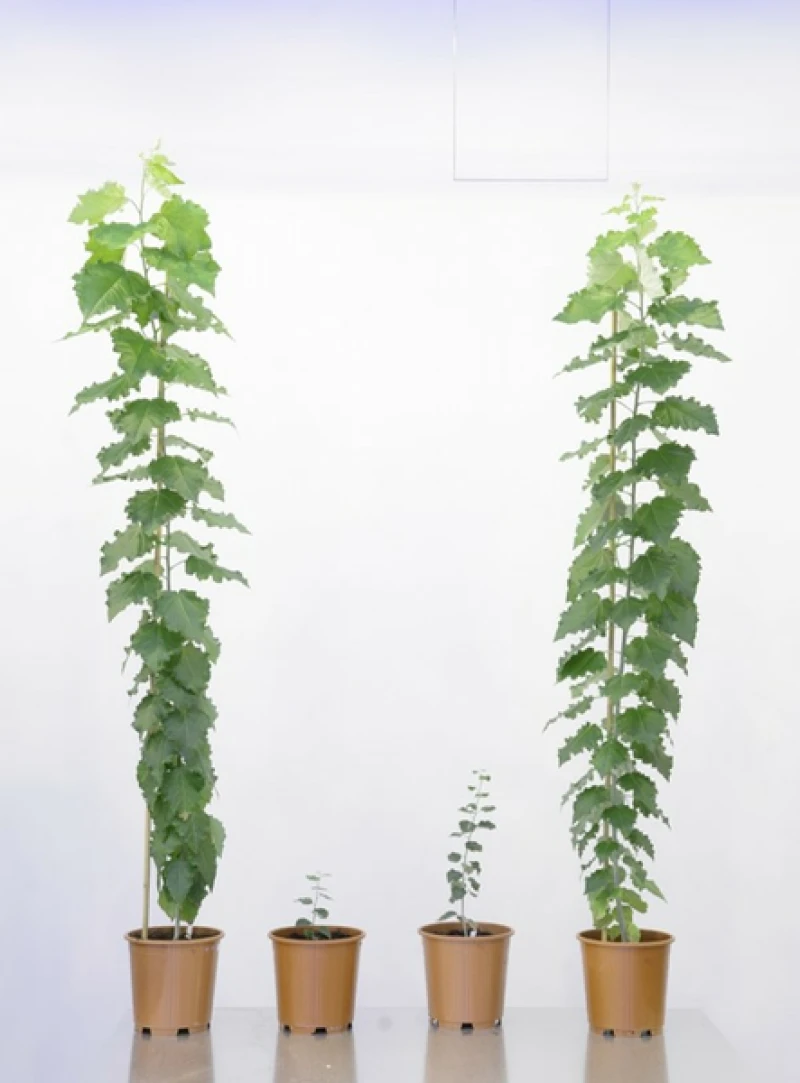CRISPR-edited poplar trees could cut carbon emissions during paper production
CRISPR-edited poplar trees could cut carbon emissions during paper production


Researchers led by prof. Wout Boerjan (VIB-UGent Center for Plant Systems Biology) have discovered a way to stably finetune the amount of lignin in poplar by applying CRISPR/Cas9 technology. Lignin is one of the main structural substances in plants and it makes processing wood into, for example, paper difficult. This study is an important breakthrough in the development of wood resources for the production of paper with a lower carbon footprint, biofuels, and other bio-based materials. Their work, in collaboration with VIVES University College (Roeselare, Belgium) and University of Wisconsin (USA) appears in Nature Communications.
Today’s fossil-based economy results in a net increase of CO2 in the Earth’s atmosphere and is a major cause of global climate change. To counter this, a shift towards a circular and bio-based economy is essential. Woody biomass can play a crucial role in such a bio-based economy by serving as a renewable and carbon-neutral resource for the production of many chemicals. Unfortunately, the presence of lignin hinders the processing of wood into bio-based products.
Prof. Wout Boerjan (VIB-UGent): “A few years ago, we performed a field trial with poplars that were engineered to make wood containing less lignin. Most plants showed large improvements in processing efficiency for many possible applications. The downside, however, was that the reduction in lignin accomplished with the technology we used then – RNA interference – was unstable and the trees grew less tall.”
Undeterred, the researchers went looking for a solution. They employed the recent CRISPR/Cas9 technology in poplar to lower the lignin amount in a stable way, without causing a biomass yield penalty. In other words, the trees grew just as well and as tall as those without genetic changes.
Dr. Barbara De Meester (VIB-UGent): “Poplar is a diploid species, meaning every gene is present in two copies. Using CRISPR/Cas9, we introduced specific changes in both copies of a gene that is crucial for the biosynthesis of lignin. We inactivated one copy of the gene, and only partially inactivated the other. The resulting poplar line had a stable 10% reduction in lignin amount while it grew normally in the greenhouse. Wood from the engineered trees had an up to 41% increase in processing efficiency”.
Dr. Ruben Vanholme (VIB-UGent): “The mutations that we have introduced through CRISPR/Cas9 are similar to those that spontaneously arise in nature. The advantage of the CRISPR/Cas9 method is that the beneficial mutations can be directly introduced into the DNA of highly productive tree varieties in only a fraction of the time it would take by a classical breeding strategy.”
The applications of this method are not only restricted to lignin but might also be useful to engineer other traits in crops, providing a versatile new breeding tool to improve agricultural productivity.
Read the original post

 | Videos | More... |

Video: Nuclear energy will destroy us? Global warming is an existential threat? Chemicals are massacring bees? Donate to the Green Industrial Complex!
 | Bees & Pollinators | More... |

GLP podcast: Science journalism is a mess. Here’s how to fix it

Mosquito massacre: Can we safely tackle malaria with a CRISPR gene drive?

Are we facing an ‘Insect Apocalypse’ caused by ‘intensive, industrial’ farming and agricultural chemicals? The media say yes; Science says ‘no’
 | Infographics | More... |

Infographic: Global regulatory and health research agencies on whether glyphosate causes cancer
 | GMO FAQs | More... |

Why is there controversy over GMO foods but not GMO drugs?

How are GMOs labeled around the world?

How does genetic engineering differ from conventional breeding?
 | GLP Profiles | More... |

Alex Jones: Right-wing conspiracy theorist stokes fear of GMOs, pesticides to sell ‘health supplements’




 Trust issues: What happens when therapists use ChatGPT?
Trust issues: What happens when therapists use ChatGPT? California, Washington, Oregon forge immunization alliance to safeguard vaccine access against federal undermining
California, Washington, Oregon forge immunization alliance to safeguard vaccine access against federal undermining Fighting deforestation with CO2: Biotechnology breakthrough creates sustainable palm oil alternative for cosmetics
Fighting deforestation with CO2: Biotechnology breakthrough creates sustainable palm oil alternative for cosmetics Viewpoint — Fact checking MAHA mythmakers: How wellness influencers and RFK, Jr. undermine American science and health
Viewpoint — Fact checking MAHA mythmakers: How wellness influencers and RFK, Jr. undermine American science and health 30-year-old tomato line shows genetic resistance to devastating virus
30-year-old tomato line shows genetic resistance to devastating virus The free-range chicken dilemma: Better for birds, but with substantial costs
The free-range chicken dilemma: Better for birds, but with substantial costs Viewpoint: Video — Big Solar is gobbling up productive agricultural land and hurting farmers yet providing little energy or sustainabilty gains
Viewpoint: Video — Big Solar is gobbling up productive agricultural land and hurting farmers yet providing little energy or sustainabilty gains ‘You have to treat the brain first’:Rethinking chronic pain with Sanjay Gupta
‘You have to treat the brain first’:Rethinking chronic pain with Sanjay Gupta
